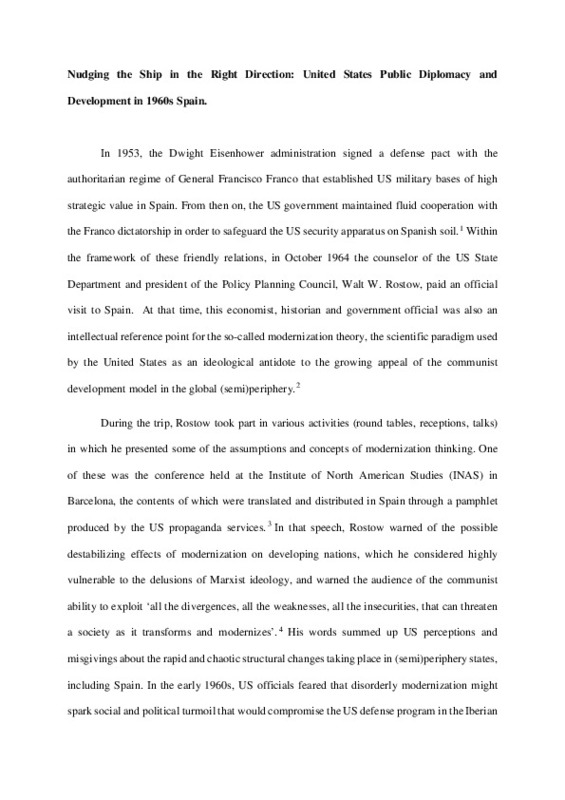JavaScript is disabled for your browser. Some features of this site may not work without it.
Buscar en RiuNet
Listar
Mi cuenta
Estadísticas
Ayuda RiuNet
Admin. UPV
Nudging the Ship in the Right Direction: United States Public Diplomacy and Development in 1960s Spain
Mostrar el registro sencillo del ítem
Ficheros en el ítem
| dc.contributor.author | Martín-García, Oscar José
|
es_ES |
| dc.date.accessioned | 2024-01-09T19:01:50Z | |
| dc.date.available | 2024-01-09T19:01:50Z | |
| dc.date.issued | 2023-07 | es_ES |
| dc.identifier.issn | 0022-0094 | es_ES |
| dc.identifier.uri | http://hdl.handle.net/10251/201654 | |
| dc.description.abstract | [EN] In the early 1960s, Franco¿s Spain began to experience a rapid process of economic growth, which was encouraged by US diplomacy as it would underpin the stability required by the US defence program in the country. However, American officials felt that such an accelerated economic development should be orderly since chaotic modernization might spark social turmoil that would compromise the US geo-strategic objectives in Spain. The article unravels the US public diplomacy programs to steer Spanish society along with a stable development path based on US-inspired capitalism and alliance with the Western bloc. It examines the cultural, educational, and informational means employed by the US government in a bid to channel the socio-economic upheaval occurring in Spain in a direction that was compatible with US security interests. We also argue that modernization theory provided the ideological and intellectual framework for US persuasion efforts to harness Spain¿s socio-economic ferment. Nevertheless, the `development model¿ promoted by the dictatorship generated inequalities and conflicts that fuelled anti-American sentiment among sectors of Spanish society called to play a role in the future post-Franco transition. | es_ES |
| dc.description.sponsorship | This article was supported by the research project Modernization, Development and Democratization. The Role of Western European Powers and International Organizations in Political and Social Change in Spain' (PGC2018-097159-B-I00), funded by the Spanish Ministry of Science, Innovation and Universities. | es_ES |
| dc.language | Inglés | es_ES |
| dc.publisher | SAGE Publications | es_ES |
| dc.relation.ispartof | Journal of Contemporary History | es_ES |
| dc.rights | Reserva de todos los derechos | es_ES |
| dc.subject | Development | es_ES |
| dc.subject | Public diplomacy | es_ES |
| dc.subject | Spain | es_ES |
| dc.subject | United States | es_ES |
| dc.subject | 1960s | es_ES |
| dc.title | Nudging the Ship in the Right Direction: United States Public Diplomacy and Development in 1960s Spain | es_ES |
| dc.type | Artículo | es_ES |
| dc.identifier.doi | 10.1177/00220094231166603 | es_ES |
| dc.relation.projectID | info:eu-repo/grantAgreement/AEI/Plan Estatal de Investigación Científica y Técnica y de Innovación 2017-2020/PGC2018-097159-B-I00/ES/MODERNIZACION, DESARROLLO Y DEMOCRATIZACION. EL PAPEL DE LAS POTENCIAS EUROPEAS OCCIDENTALES Y DE LAS ORGANIZACIONES INTERNACIONALES EN EL CAMBIO POLITICO Y SOCIAL DE ESPAÑA/ | es_ES |
| dc.relation.projectID | info:eu-repo/grantAgreement/Ministerio de Economía y Competitividad//RYC-2016-20120//SUBVENCIONES A LA CONTRATACION DE DOCTORES POR CENTROS DE I+D. RAMON Y CAJAL 2016/ | es_ES |
| dc.rights.accessRights | Abierto | es_ES |
| dc.description.bibliographicCitation | Martín-García, OJ. (2023). Nudging the Ship in the Right Direction: United States Public Diplomacy and Development in 1960s Spain. Journal of Contemporary History. 58(3):531-553. https://doi.org/10.1177/00220094231166603 | es_ES |
| dc.description.accrualMethod | S | es_ES |
| dc.relation.publisherversion | https://doi.org/10.1177/00220094231166603 | es_ES |
| dc.description.upvformatpinicio | 531 | es_ES |
| dc.description.upvformatpfin | 553 | es_ES |
| dc.type.version | info:eu-repo/semantics/publishedVersion | es_ES |
| dc.description.volume | 58 | es_ES |
| dc.description.issue | 3 | es_ES |
| dc.relation.pasarela | S\490122 | es_ES |
| dc.contributor.funder | Agencia Estatal de Investigación | es_ES |
| dc.contributor.funder | Ministerio de Economía y Competitividad | es_ES |







![[Cerrado]](/themes/UPV/images/candado.png)

